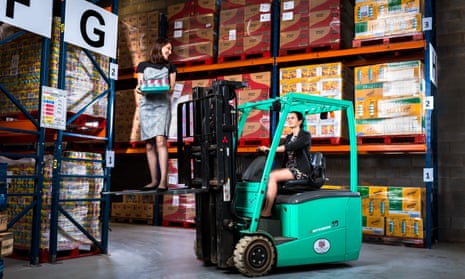“Within one community, there can be a business that’s throwing away perfectly good food and just around the corner there’s a charity that’s struggling to feed people in need,” says Iseult Ward of FoodCloud, a remarkable social enterprise which she co-founded with Aoibheann O’Brien in 2012. “We wanted to connect the two.”
Ward, who is 26, was studying business and economics at Trinity College, Dublin, where O’Brien, 31, was completing a masters in environmental science. Neither were particularly tech-savvy – they bonded over “a love for food and a distaste for waste” – but that didn’t deter them from using technology to address the problem. “We developed an app that would help businesses notify charities when they had surplus food available,” says Ward.
It took them a year and a half to build. To use FoodCloud, the retailer simply uploads details of what’s available to the app. Local charities receive that information automatically, collect the surplus food at an appointed time and distribute it to those in need. The idea appealed to Tesco Ireland, which offered FoodCloud a trial just as Ward was finishing her degree. Tesco later introduced the service to all of its 140 stores around Ireland.
Now FoodCloud is expanding. In partnership with the food supply organisation FareShare, the start-up is helping 929 Tesco stores donate to 3,979 charities around the UK. According to Rachel Finn, Tesco’s head of community food projects, “We’re going to need about 5,000 charities to make sure all that food finds a home.”
But why did this disconnect between retailers and charities exist? An estimated 1.9m tons of food is wasted in the UK grocery supply chain every year, according to the Waste and Resources Action Programme (Wrap). Meanwhile food poverty is on the rise – figures from the Trussell Trust show that food-bank use has increased more than 40-fold in the UK since 2008-09. It seems indefensible that supermarkets are throwing away good produce.

“What you learn,” says Tesco’s Rachel Finn, who helped implement the FoodCloud technology in the UK, “is that it’s genuinely hard to give away food for free. In our shops, there are uncertainties in supply and demand which means we’re not a good match for the voluntary sector. Then you have to work through food safety. And then, assuming you’ve cleared all of that, you have to do it every day. It’s very difficult.”
Ward agrees. “Managing relationships with charities isn’t part of a retailer’s core business, so we had to make it really easy for them to donate food. Charities, on the other hand, are often understaffed and low on resources, so we had to make the process easy for them as well.”
To do this, FoodCloud had to be more than just a clever piece of technology. In Ireland, the start-up – a team of 12 full-time and six part-time staff, with twice as many women as men – have been in charge of finding and vetting the charities for Tesco. They have a food safety officer who works with the charities, making sure the food is properly stored after collection. They also provide guidance on legal issues and draw up written agreements. If someone were to get sick from eating surplus meat, for example, both sides need to be absolutely clear where the responsibility lies.
Finn is full of admiration for what FoodCloud has achieved. “As well as providing the technology, they were also able to do the matchmaking that helped get it off the ground,” she says. “We learned a lot from what they were doing in Ireland.”
The role of technology shouldn’t be underestimated here. Simple though FoodCloud’s app may be, it enables donations on a scale that was unimaginable before smartphones became ubiquitous. “As the technology improves, we’re finding more effective solutions to problems that we weren’t able to solve efficiently before,” says Ward. She praises a number of other start-ups harnessing technology to similar ends, including Olio, a UK app that allows you to share surplus food with your neighbour, and Zero Percent and Food Donation Connection in the US, which also help businesses donate food. “It’s incredibly encouraging that more start-ups are looking to address the food waste problem.”
Where FoodCloud diverges from your average tech start-up is that it’s not a profit-making enterprise – retailers pay a fee for the service, but all the money goes towards covering operational costs. Still, Ward has big ambitions for FoodCloud. As well as Tesco, they’ve been working with Aldi in Ireland (who have donated 500,000 meals via FoodCloud, saving more than €700,000 for the charities and community groups involved) and hope to have all major Irish retailers on board in the near future. And through a new initiative called FoodCloud Hubs, which O’Brien is running, they are looking at other areas of the food industry, particularly manufacturing and distribution where they can access much larger quantities of surplus food with a longer shelf life.
But this isn’t all about networks and supply chains, nor can you judge FoodCloud purely on the number of meals they’ve helped donate – 8.4m in the UK and Ireland since they launched. It’s also about the tangible difference that the start-up is making in people’s everyday lives. Ward tells me they are working with a women’s refuge in Ireland where many of the residents find it difficult to socialise. “Now the managers are noticing that when the food donation arrives twice a week, the women are coming out of their rooms, swapping food and sharing recipes, and there’s laughter in the room. The recognition that food is about far more than nutrition, that it also has the potential to connect and empower people. For us that’s one of the most powerful pieces of feedback we can get.”
For more information, go to FoodCloud

Comments (…)
Sign in or create your Guardian account to join the discussion